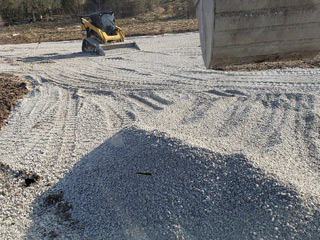Top 4 Roadway Surface Options
 When constructing or repairing a roadway, choosing a suitable surface is crucial. The roadway surface can impact everything from its durability and safety to its appearance and cost. Here we look at the four preferred roadway surface options, their benefits, and their drawbacks to help you make an informed decision for your next roadway project.
When constructing or repairing a roadway, choosing a suitable surface is crucial. The roadway surface can impact everything from its durability and safety to its appearance and cost. Here we look at the four preferred roadway surface options, their benefits, and their drawbacks to help you make an informed decision for your next roadway project.
Asphalt Surface Roads
Asphalt is the most common material used for roadway surfaces, and for a good reason. Asphalt is a durable and relatively inexpensive material that can be quickly and easily applied to various roadway surfaces. Asphalt is also flexible, allowing it to expand and contract with temperature changes, preventing cracks and other types of damage.One of the most significant drawbacks of asphalt surface roads is that they require regular maintenance and resurfacing to maintain their appearance and safety. Asphalt roads are also prone to damage from heavy vehicles, extreme weather conditions, and oil and gas spills.
Concrete Surface Roads
Concrete is another popular option for roadway surfaces, particularly in urban areas. Concrete roads are incredibly durable and withstand heavy traffic and extreme weather conditions. Concrete roads are also relatively easy to maintain, requiring minimal upkeep and repair.One downside of concrete surface roads is their cost. Concrete roads are significantly more expensive to install than asphalt roads, and their rigid structure can make them prone to cracking in extreme temperatures. The material is also less forgiving than asphalt, leading to a more uncomfortable ride for drivers and passengers.
Gravel Surface Roads
Gravel roads are common in rural areas, where the cost of constructing and maintaining paved roads can be prohibitively high. The material is inexpensive, and the roads are relatively easy to build, making them a popular option for local roads and driveways.However, gravel roads can be challenging to maintain and can quickly become rutted and potholed, especially during heavy rainfall or snowfall. The surfaces can also be dusty in dry weather and become slick and hazardous during rain or snow.
Porphyry Paver Surface Roads
Porphyry pavers are a relatively new option for roadway surfaces, but they are gaining popularity for their durability, aesthetic appeal, and environmental benefits. Porphyry pavers are made from natural stone and are available in a wide range of colors and textures.These roads are highly durable and can endure exposure to the elements and heavy traffic conditions. They are also easy to maintain and repair, as you can easily replace damaged pavers without affecting the rest of the roadway surface.
The surfaces also offer environmental benefits. Porphyry is a natural stone quarried and processed with minimal environmental impact. These units are also permeable, allowing water to seep through and replenish groundwater.
Make The Right Roadway Choice
The appropriate roadway surface is crucial for building a secure, long-lasting, cost-effective roadway. Each of the four alternatives we have covered has its advantages and disadvantages.Therefore, it is essential to consider factors such as location, traffic volume, and environmental impact while deciding. Always seek advice and guidance from a professional roadway construction company to receive expert recommendations.
For more about our private roadway surface options, please contact Adam Nash Enterprise Inc. by filling out our Online Form or calling us at 615-390-0948.
<< Back to Articles
We Provide Services to the Following Cities, Towns and Surrounding Regions of TN:

